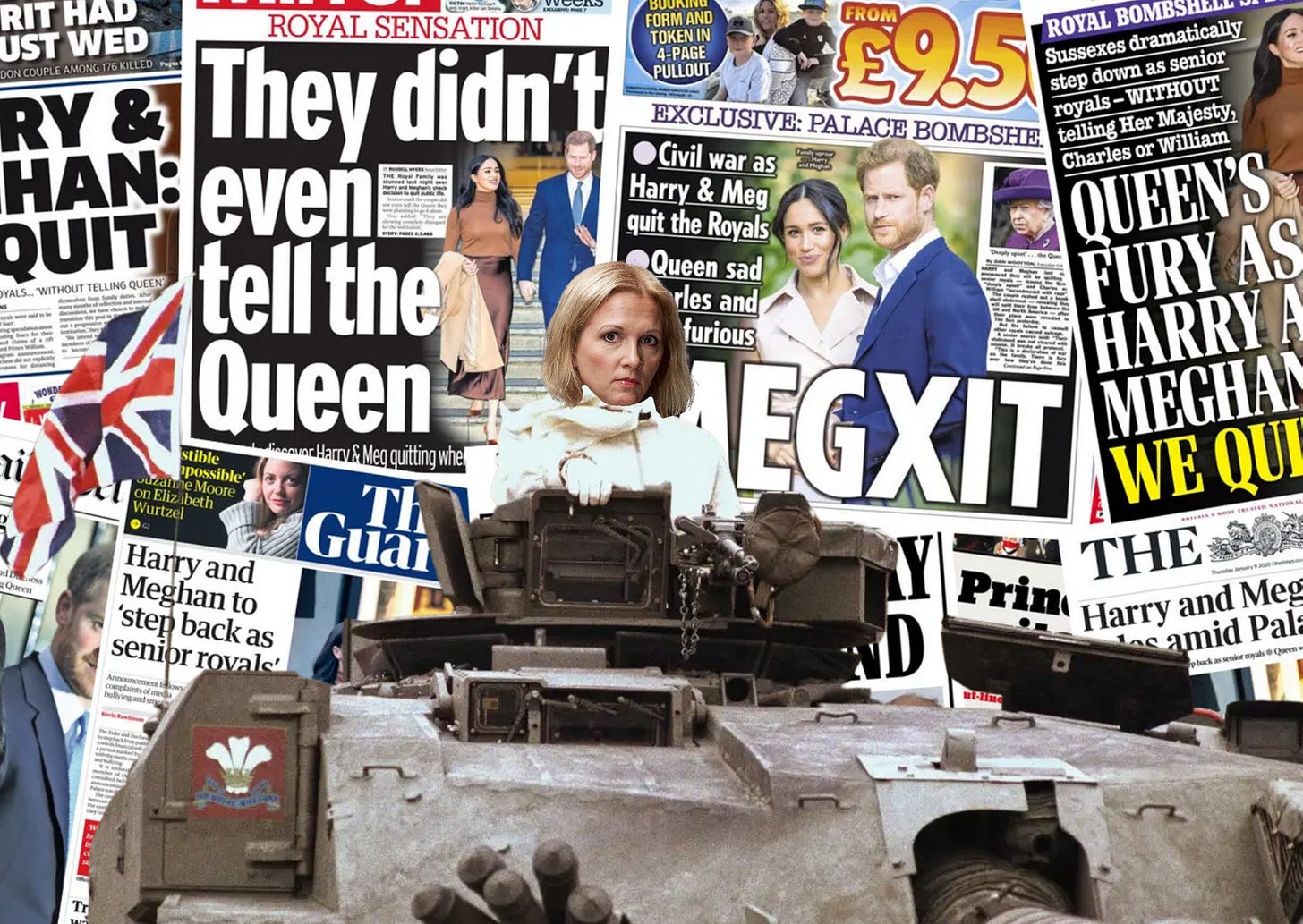A cowardly page, Turner: How one Times column tells you everything about the British media's war on Meghan
You can expect a full fortnight of this stuff once the interview is out.
“Some people say” is one of many weaselly journalistic constructions you can deploy when you want to say what you think without all the inconvenience of actually taking responsibility for your opinions. It turns up in the British press on a daily basis along with its sly cousins "everybody is talking about…”, “the public thinks” and “I’ve been told.”
In the run-up to the Duchess of Sussex’s Oprah interview, the newspapers are stuffed full of “sources say…” stories and analysis from the desiccated disasters that form the ranks of ‘royal experts’. But in today’s Times, Janice Turner has managed to write a piece of such side-talking snippiness that the rest of the Royal chasing pack must be frothing with envy.

Turner takes the ‘some people say’ formula and mixes it with a familiar tactic among columnists — opinions written like they’re facts. Under the headline, Love or loathe Meghan? It depends on your age and the lede “Where the over-40s smell a woke schemer with a masterplan, the younger generation see a role-model and a martyr”, Turner writes:
Forget the diamond earrings, palaces and scheming aides. Transpose the Sussex saga to an ordinary family where a hot-headed younger son and his wife air a lifetime of slights and grievances on Facebook, while grandad is on his sickbed. There would be a flurry of furious posts, passive-aggressive “likes” and bitter unfriendings… This is why even the most high minded among us are sucked into this royal feud. Even before the Oprah interview is aired, this family is surely broken. It shattered the moment palace staff put away politesse for propaganda war, calling the duchess a bully before she could lay claim to being the most bullied of all.
If you think this is the moment that the Royal Family, the people who have been putting the dysfunction into ‘purely political function’ long before even the abdication crisis of 1936, was “broken” you’ve not been paying attention. And trust Turner, one of the leaders of the militant wing of Mumsnet, to boil everything down to Facebook drama. So relatable, right?
Despite making her view abundantly clear in a surfeit of snidey asides and through her word choice, Turner attempts to frame herself as an observer commenting on the gulf between her generation and ‘the young’:
So who is to blame for this mess, who is wronged and who wronged against? Your answer will probably depend upon your generation. Most over-40s regard Meghan as a ruthless operator who never intended to open leisure centres in British provincial towns but wanted to bag royalty to use as leverage back in LA. For them, this kohl-eyed confession is not a desperate plea to be heard, as when Diana met Martin Bashir, but the happy realisation of her masterplan. (She invited Oprah to her wedding, after all, when they’d barely met.)
Boomers see Meghan as a deepfake Diana. While the Princess of Wales was a dynastic virgin sacrifice, traduced into a lonely faithless marriage, then in divorce fed to the paparazzi, what’s the worst Meghan endured? A row about her wedding tiara?
The royal family embraced her mother; Prince Charles walked Meghan down the aisle when her own bizarre father bailed; her wedding was a celebration of her African-American heritage that the British public overwhelmingly loved. Racism was mainly in social media’s dank crevices. The principal prejudice against her was that she was Californian, carrying all the usual save-the-planet-from-my-jet hypocrisy that it entails. Worst of all, she was an actress.
Diana is now the saint, Meghan the sinner, as if the Princess of Wales was never framed as a schemer by the British media. As it goes, I think all royalty is a scam, a roach motel for people who believe that someone can be born ‘special’ by dint of emerging from a magic vagina. I thought less of Meghan for entering into it and more of her when she and Harry decided to ditch the hollow life of “[opening] leisure centres in British provincial towns”.
Turner unsurprisingly shifts any blame for racism in this case onto social media, ignoring the fact that her paper and others across Fleet Street have been bulk buying dog whistles ever since Meghan and Harry first started dating. The Duchess of Cambridge specifically went to St. Andrews in the hopes of meeting Prince William, but her obsession with him from the age of 9 is seen as sweet and not scheming. Qwhite difficult to work out why that is…
Could it be perhaps that the Royal Family did not ‘embrace’ Meghan but rather liked the PR potential of having a mixed-race member of ‘The Firm’ so long as she toned down all the ‘having her own opinions’ stuff? Turner’s framing of the Royals as jolly accommodating race-blind lovelies goes against many examples of them using racist language. And I’m not just talking about Prince Philip.
In 2009, it emerged that Prince Charles’ nickname for his friend, Kolin Dhillon, a multi-millionaire property developer with whom he has played polo, is “Sooty”. And in 2018, when he met the writer, Anita Sethi, who was born in Manchester and has Guyanan roots, Charles asked her where she was from. When she said, “Manchester,” he replied: “Well, you don’t look it.”
It’s not hard to imagine how the Royal Family talks behind closed doors.
The real aim of Turner’s column is to dismiss the idea that the British establishment is in any way racist and she’ll contort herself into whatever shape is required to achieve that. It’s why she includes the Duchess’ miscarriage in a list of ‘burdens’, alongside a nasty dismissal of mental health issues:
… to inspire now you must first have suffered. Achievement is optional. And Meghan, driven from Britain for the crime of rescuing a tragic prince, is living proof in their eyes of the racist British establishment. Add her other burdens — a miscarriage, being “a young mother” (an oft-invoked new category of oppressed being) plus the non-specific yet irrefutable “mental health issues” — and Meghan is impregnable in a victimhood which offsets her 11-bedroomed mansion privilege, her gazillion-pound Netflix deals. She is beyond question, above reproach.
I think the Sussexes have a tendency to talk in Californian therapy speech, which grates, and they’re no doubt dripping with privilege, but neither thing means that they cannot suffer from mental health issues, nor that a miscarriage is suddenly easier to bear. Turner knows this too but everything is grist to the Mean Girls mill.
The column also uses a familiar British newspaper trick — the “unquestioned we”, in which ‘we’ is used without reference to who ‘we’ actually are. In this case, ‘we’ is people who agree with Janice Turner and buy in, as all the newspapers do, to the notion that a Constitutional Monarchy is a remotely sensible way to run a country almost a quarter of the way into the 21st century. She writes:
Those of us who began as youthful republicans gradually concluded that contracting out soldier-inspecting and ribbon-cutting to one odd family was archaic but it kept out politicans out of presidential palaces, all the easier to kick them. We saw the royals as having a defined constitutional job, we grudgingly concede their wealth, we respect the Queen’s stoicism. But higher moral beings? Naff off — Nelson Mandela and Malala they are not.
The final line is correct but Turner is still taking sides between one set of spoiled rich people and another. By implication and inference, she backs the Queen, who has spent her entire reign quietly scheming, over the young actress who has the whole British media ranged against her. Acting as though republicanism is just one of the follies of youth and that getting in line with the establishment is what grown-ups do is just another example of how thoroughly sclerotic the British columnist class is and will continue to be.
Inevitably, Turner also reheats the false notion that Meghan and Harry talking about anything is hypocritical because they don’t like newspapers writing false stories about them:
But the very things which enrage Meghan haters — that she flees Britain to safeguard her privacy then spills to Oprah, or sues newspapers for printing personal letters then details her miscarriage — are admired by her fans.
As the apogee of “influencer” culture, her images under a tree tenderly holding her bump with her head on Harry’s knee are inevitably contrived — compare with Kate Middleton’s shonky family snaps — because such curation is diligently building your brand.
The Meghan haters and fans slug it out online, two opposing notions of royalty and generational differences about what it means to be good. To doubt Meghan makes you a secret racist, to love her makes you a reveller in phoney victimhood. A royal feud generating a feud in a million family homes.
Meghan Markle was a celebrity before she met Prince Harry. As an actress, she’d spent a good chunk of her life doing interviews and publicising her projects. She’s not suddenly turned into this character; it’s who she was before she joined the Royal Family and tried to concede to their weird pseudo-silent antics. And the notion that Kate and Wills do not micro-manage every publicity photo and utterance is laughable. The ‘shonky family snaps’ are branding all the same.

While Turner wants to play the wise intergenerational analyst in the piece, she’s honking away the dog whistle as much as her more downmarket colleagues at The Sun. For decades, the ‘broadsheets’ have offered up fundamentally the same takes as their tabloid siblings; they simply lard their arguments with some more syllables and far fewer puns.
This video by Josh Pieters and Archie Manners showing ‘royal experts’ giving reviews of the Oprah interview before they’ve even seen it shows exactly how the monarchy commentary racket works:
What makes Janice Turner’s contribution to the despicable discourse ahead of the Oprah interview specifically grim is the cowardice baked into it. She wants to criticise Meghan but does so by talking in a high-handed and slightly distanced way about disagreements between the generations, rather than admitting these are her opinions. It’s a cheap way to join in the hunt without having to take responsibility for the damage.
Programming note:
From Monday, paid subscribers will get two extra editions of this newsletter — the Media Diet on Monday evening (an interview with someone interesting about what they read, watch and listen to…) and the Friday evening briefing with must-read stories and some extra analysis.
If you’re not a paid subscriber, you’ll still get the daily newsletter, and if you want to upgrade to a paid subscription, just hit the button:





